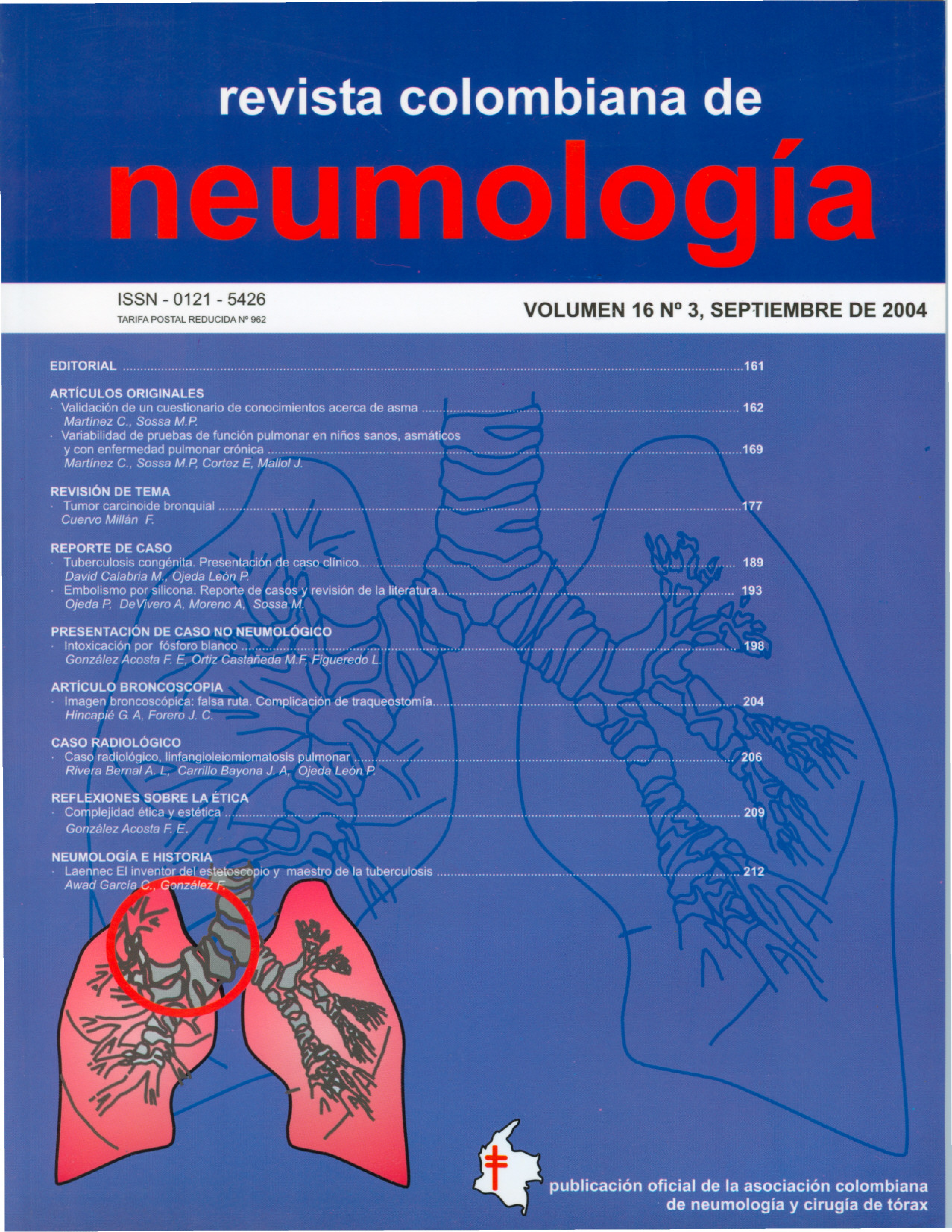Validación de un cuestionario de conocimientos acerca de asma
Validación de un cuestionario de conocimientos acerca de asma

This work is licensed under a Creative Commons Attribution-NonCommercial-ShareAlike 4.0 International License.
Ninguna publicación, nacional o extranjera, podrá reproducir ni traducir sus artículos ni sus resúmenes sin previa autorización escrita del editor; sin embargo los usuarios pueden descargar la información contenida en ella, pero deben darle atribución o reconocimiento de propiedad intelectual, deben usarlo tal como está, sin derivación alguna.
Show authors biography
Background. An educative intervention destined to increase the knowledge in asthma allows the children and/or its parents to acquire abilities that allow to prevent and/or to handle the asthmatic attacks, decreasing the morbidity produced by the disease. Nevertheless, we don't account with a validated instrument that allows us to quantify the level of asthma knowledge.
Objective. To develop and to validate a questionnaire of knowledge about asthma to be filled out by the parents and/or people in charge of the care of the asthmatic pediatric patients.
Material and method. The 17 items that conform the questionnaire were obtained after literature review, realization of focal groups, the professional experience of the investigators and the realization of pilot studies. The face, content, and concurrent validity of the instrument was evaluated; we also determined the factor structure, test-retest reproducibility, and sensitivity to change of the questionnaire.
Results. We included 120 patients with average age of 4,5 +3,7 years. The factor analysis demonstrated a probable structure of three factors, that altogether explain 85% of the total variance of the results. The face and content validity was based on the concept of a multi-disciplinary group of experts in the field, The concurrent validity was demonstrated by the ability of the questionnaire to distinguish low from high knowledge parents. Test-retest reproducibility and sensitivity to change were demonstrated comparing scores of the questionnaire filled out in two different occasions.
Conclusions. The questionnaire of knowledge of asthma developed in the study is a useful and reliable tool to quantify the basal level of asthma knowledge in parents of asthmatic children, and to determine the effectiveness of an educative intervention destined to increase the knowledge and understanding of the disease.
Article visits 33 | PDF visits 20
Downloads
- National Heart Lung and Blood Institute. Expert Panel Report
- Guidelines for the Diagnosis and Management of Asthma. Bethesda, Md: National Institutes of Health, 1997.
- Clark NM, Zimmerman BJ. A social cognitive view of selfregulated learning about health. Health Educ Res 1990; 5:371-79.
- Green LW, Frankish CJ. Theories and principles of health education applied to asthma. Chest 1994; 4: 2195-30S.
- National Institutes of Health/National Heart, Lung, and Blood Institute. Global Initiative for Asthma. Global strategy for asthma management and prevention. Bethesda: National Institutes of Health; 2002. Publication 02-3659.
- Allen RM, Jones M. The validity and reability of an asthma knowledge questionnaire used in the evaluation of a group asthma education self-management program for adults with asthma. J. Asthma 1998; 35: 537-45.
- Joint Task Force. Practice parameters for the diagnosis and treatment of asthma: G. Patienet education. J Allergy Clin Immunol 1995; 96: 811-20.
- Neri M, Migliori GB, Spanevello A, et al. Economic analysis of two structured treatment and teaching programs on asthma. Allergy 1996; 51: 313-19.
- Sánchez R, Gómez C. Conceptos básicos sobre validación de escalas. Rev Col Psiquiatría 1998; 2: 121-30.
- Fitzclarence CA, Henry RL. Validation of an asthma knowledge questionnaire. J Pediatr Child Health 1990; 26: 200-4.
- Fletcher RH, Fletcher SW, Wagner EH. Clinical Epidemiology: The essentials. Baltimore. Williams & Wilkins, 1996.
- Knapp RG, Clinton M. Clinical Epidemiology and Biostatistics. Baltimore. Williams & Wilkins, 1992.
- Streiner D, Norman GR. Health measurements scales. A practical guide to their development and use. Oxford. Oxford University Press, 1995.
- RuizA, Gómez C, Trujillo D. Investigación clínica: Epidemiología clínica aplicada. Bogotá. CEJA, 2001.
- Badia Llach X, Benavides RuizA, Rajmil Rajmil L. instrumentos de evaluación de la calidad de vida relacionada con la salud en niños y adolescentes con asma. An Esp Pediatr 2001; 54:213-21.
- Ho J, Bender BG, Gavin LA, O'Connor SL, Wamboldt MZ, Wamboldt FS. Relations among asthma knowledge, treatment adherence, and outcome. J Allergy Clin Immunol 2003; 111: 498-502.
- Parcel GS, Nader PR, Tiernan K. A health education program for children with asthma. J Dev Behav Pediatr 1980;1:128-32.
- Moosa SE, Henley LD. An evaluation of parental knowledge of childhood asthma in a family practice setting. S Afr Med J 1997;87:42-5.
- Brook U, Mendelberg A, Heim M. Increasing parental knowl- edge of asthma decreases the hospitalization of the child: a pilot study. J Asthma 1993;30:45-9.
- Lin, L. I-K. A concordance correlation coefficient to evaluate reproducibility. Biometrics 1989; 45: 255-68.
- Cronbach LJ. Coefficient alpha and the internal structure of test. Psychometrika 1951; 16: 297.
- Gortmaker SL, Walker DK, Jacobs FH, Ruch-Ross H. Parental smoking and the risk of childhood asthma. Am J Public Health 1982; 72: 574-579.
- Evans D, Levinson MJ, Feldman CH, Clark NM, Wasilesky V, Levin B, Mellins RB. The impact of passive smoking on emergency room visits of urban children with asthma. Am Rev Respir Dis 1987; 135: 567-572.







